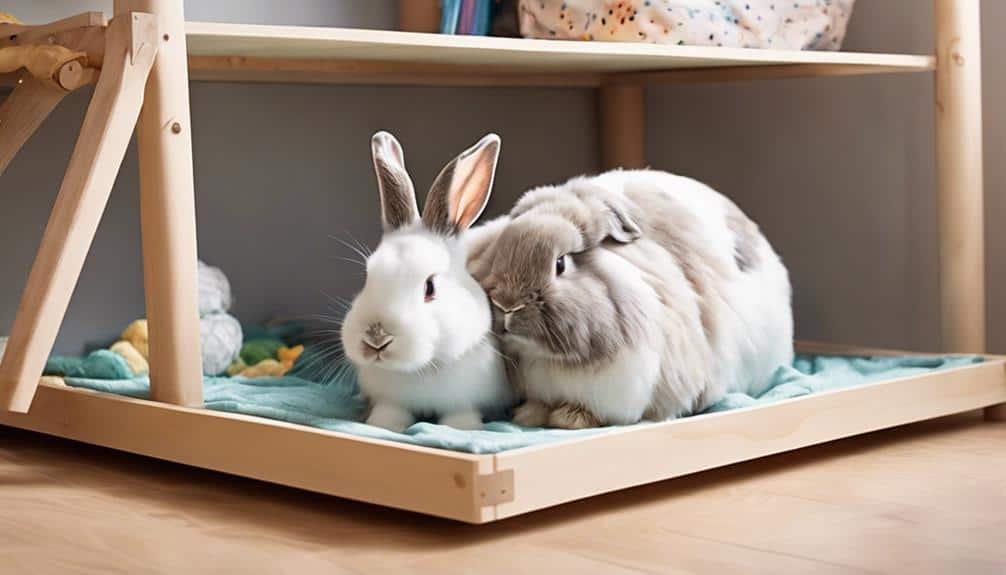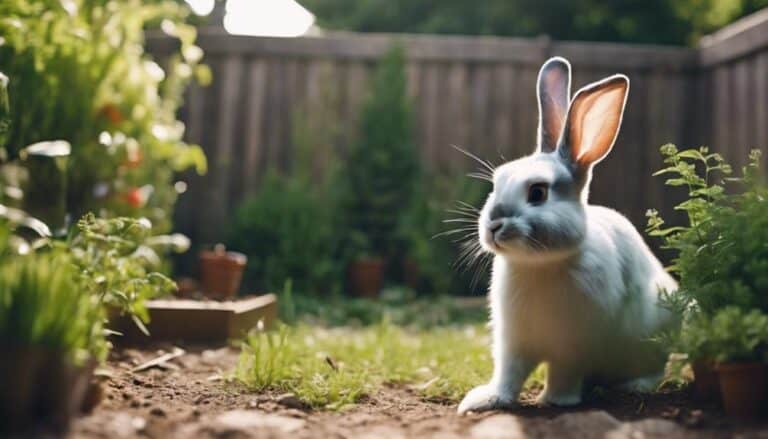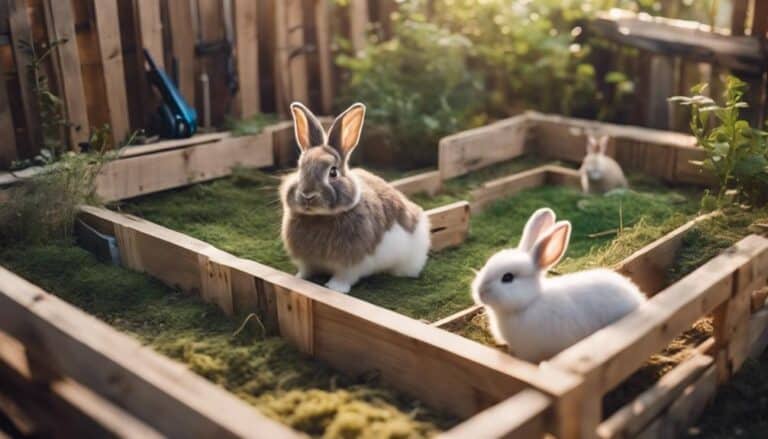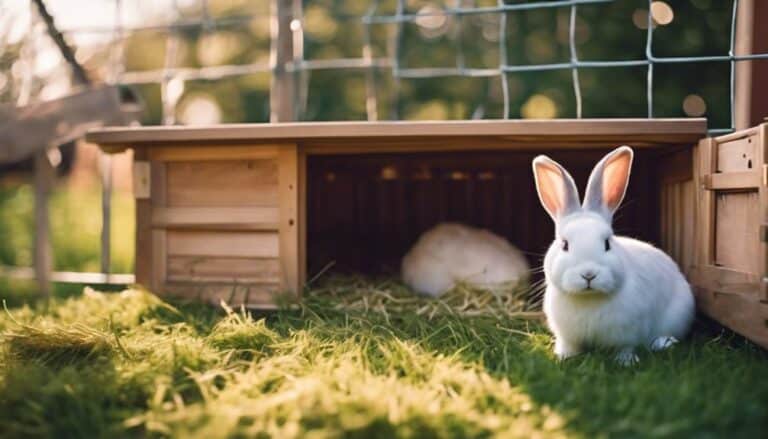Imagine a world where your furry companion hops around in a space catered to their every need, where safety meets comfort seamlessly. But why is creating a bunny-friendly environment so crucial?
The answer lies in the intricate balance between their physical and emotional well-being. By focusing on their habitat, nutrition, exercise, socialization, and stress levels, you can discover the secret to a happy and healthy bunny.
So, are you ready to reveal the key to a harmonious life with your adorable hopper?
Contents
- 1 Key Takeaways
- 2 Importance of a Safe Bunny Habitat
- 3 Nutritional Needs for Bunny Health
- 4 Bunny Exercise and Play Requirements
- 5 Bunny Socialization and Interaction Benefits
- 6 Bunny Stress Reduction Techniques
- 7 Frequently Asked Questions
- 8 How Does the Environment Impact a Bunny’s Behavior, and Why is it Important to Consider?
- 9 Conclusion
Key Takeaways
- Bunny-friendly environments ensure physical and mental well-being.
- Proper nutrition and exercise prevent health issues.
- Socialization and interaction enhance bunny happiness and health.
- Stress reduction strategies promote a calm and secure environment.
Importance of a Safe Bunny Habitat

Creating a secure and comfortable habitat is essential for ensuring the physical and mental well-being of your bunny. Rabbits thrive in environments that provide safety, access to proper shelter, and opportunities for exercise.
A safe environment not only prevents physical harm but also plays a significant role in maintaining your bunny's mental health. When rabbits have access to hiding places and shelter, they feel secure and can exhibit natural behaviors without fear, reducing stress and potential health issues.
Additionally, offering spaces for exercise promotes physical well-being, preventing obesity and promoting agility.
Nutritional Needs for Bunny Health
Ensuring peak health for your bunny begins with understanding and providing for its nutritional needs. A rabbit's diet should primarily consist of fresh hay, which is important for maintaining healthy digestion and wearing down their teeth. High-fiber hay helps prevent gastrointestinal issues and promotes best gut function.
Supplementing hay with leafy greens, vegetables, and a small amount of pellets provides essential nutrients and variety in their diet. While fruits and treats can be offered occasionally, limiting their intake is essential to prevent obesity and maintain a well-balanced diet for your rabbit.
Additionally, ensuring access to fresh water at all times is crucial to prevent dehydration and support overall health. By carefully monitoring and adjusting your bunny's diet to meet these nutritional requirements, you can help them lead a healthy and happy life.
Bunny Exercise and Play Requirements

To maintain peak health and well-being for your bunny, it's imperative to understand and cater to their exercise and play requirements. Rabbits need a minimum of 3-4 hours of exercise outside their hutch each day to remain healthy and content. Providing a large, secure run attached to the hutch allows them to run, hop, and engage in natural behaviors. Without adequate exercise, rabbits are at risk of developing obesity, muscle atrophy, and behavioral issues.
Play areas equipped with toys, tunnels, and obstacles not only keep bunnies physically active but also stimulate them mentally, promoting overall well-being. Regular play and exercise are critical as they help prevent boredom, reduce stress, and strengthen the bond between you and your furry companion. By investing time and effort into creating stimulating play areas and providing opportunities for exercise, you can guarantee your bunny leads a fulfilling and healthy life.
Bunny Socialization and Interaction Benefits
Socializing and interacting with humans and other rabbits is essential for reducing stress and loneliness in bunnies. Regular handling and playtime play an important role in helping bunnies build trust and form strong bonds with their owners. These interactions provide mental stimulation, preventing boredom and behavioral issues in rabbits. Social bunnies tend to be happier, healthier, and more well-adjusted pets overall. Positive social experiences contribute greatly to enhancing a bunny's well-being and quality of life.
When you engage in socialization with your bunny, you're offering them the opportunity to feel secure and loved. Through gentle handling and interactive play sessions, you're fostering a sense of trust that strengthens your bond. This bond isn't only emotionally rewarding for both you and your bunny but also has notable benefits for their mental and physical health. By prioritizing social interactions, you're actively contributing to your bunny's happiness and overall well-being. Remember, the time invested in building these relationships with your bunny will result in a contented and flourishing companion.
Bunny Stress Reduction Techniques

When considering ways to decrease stress in your bunny, incorporating hiding spots and tunnels into their environment can provide a sense of security and comfort. Bunnies naturally seek out safe spaces to retreat to when feeling overwhelmed, making hiding spots essential for their well-being.
Additionally, offering a variety of toys and chew items can help keep your bunny mentally stimulated and engaged, reducing their stress levels. Introducing these enriching elements into your bunny's living area can create a calm environment that promotes relaxation and peace of mind.
Establishing a consistent daily routine for your bunny, including regular feeding times and play sessions, can greatly contribute to their sense of security and reduce stress. Moreover, utilizing pheromone diffusers or calming sprays specifically designed for rabbits can aid in creating a soothing atmosphere that helps alleviate anxiety and tension.
Frequently Asked Questions
Why Do Rabbits Need a Suitable Environment?
Rabbits need a suitable environment to exhibit natural behaviors and prevent boredom. Housing requirements, enrichment activities, social interactions, and more contribute to their well-being. Providing the right setting is essential for their health and happiness.
What Is the Importance of Rabbit in Environment?
Creating a bunny-friendly environment is essential for environmental impact, habitat preservation, biodiversity conservation, ecosystem health, wildlife protection, climate change mitigation, sustainable living, conservation efforts, ecological balance, and species protection. Your efforts support a healthy ecosystem.
What Are the Advantages of Rabbit Housing?
In creating a bunny-friendly environment, advantages of rabbit housing include health benefits, behavioral enrichment, safety, social interactions, exercise opportunities, temperature regulation, psychological well-being, disease prevention, nurturing natural instincts, and ensuring their comfort level.
Why Are Bunnies Eco Friendly?
Bunnies are eco-friendly due to their small carbon footprint, low impact diet, and biodegradable waste. They make sustainable companionship, being energy efficient pets and eco-conscious critters. By creating a bunny-friendly environment, you support a green household and earth-loving companions.
How Does the Environment Impact a Bunny’s Behavior, and Why is it Important to Consider?
The environment’s effect on bunny behavior is significant. A stressful or noisy environment can make bunnies anxious and skittish, impacting their overall well-being. It’s important to consider the environment when caring for bunnies to ensure they are in a comfortable and safe space that promotes their natural behaviors and happiness.
Conclusion
In summary, establishing a bunny-friendly environment is essential for the well-being of your furry friend. By offering a safe habitat, fulfilling their nutritional requirements, guaranteeing exercise and playtime, encouraging socialization, and minimizing stress, you're providing your bunny with the best opportunity for a happy and healthy life.
Remember, a content bunny leads to a content home – so hop to it and ensure your fluffy companion is living their best life!






